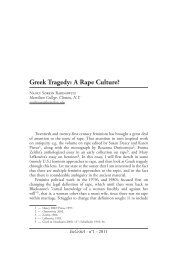Perspectives On and Of Livy's Tarpeia - EuGeStA
Perspectives On and Of Livy's Tarpeia - EuGeStA
Perspectives On and Of Livy's Tarpeia - EuGeStA
You also want an ePaper? Increase the reach of your titles
YUMPU automatically turns print PDFs into web optimized ePapers that Google loves.
188 TaRa WeLCh<br />
where self meets other (sc. obuia fuit): the Porta Capena, Rome’s southern<br />
entrance. she is inside going out, <strong>and</strong> he is outside coming in. horatius<br />
emphasizes as much at the edges of his speech, with abi <strong>and</strong> eat. We might<br />
also note that he too at this moment st<strong>and</strong>s between identities. Though<br />
he is identified with the Roman perspective (his victory is the public<br />
joy), he now has the trappings of his enemies, carrying their spoils <strong>and</strong><br />
wearing the betrothed Curiatius’ cloak (cognito super umeros fratris paludamento<br />
sponsi) 48 . It is my fancy that Livy puts both fratris <strong>and</strong> sponsi in<br />
the genitive to suggest the interchangeability of one with the other, with<br />
only their location in the sentence to distinguish them 49 .<br />
It is not only horatia’s national identity that is confounded; she similarly<br />
resists familial <strong>and</strong> gender identification. Is she, or is she not, a part<br />
of her natal family? her brother believes she still is <strong>and</strong> accuses her of<br />
being forgetful of it (oblita, cf. Tanaquil at 1.34.5, cited above, who had<br />
forgotten: oblita ingenitae erga patriam caritatis). This justifies his treating<br />
her as an outsider. But oblita implies that she has once been mindful of<br />
it, <strong>and</strong> evokes the idea that her identity has not been stable over time or<br />
perhaps cannot be stable because of her gender. When young horatius is<br />
on the verge of public punishment, moreover, her father intervenes <strong>and</strong><br />
firmly repositions her within his own family, calling her his filiam <strong>and</strong><br />
asserting his right (patrio iure) to do with her – <strong>and</strong> her brother – as he<br />
wishes (1.26.9) 50 . We might underst<strong>and</strong> the younger horatius’ position,<br />
like his sister’s, as “not yet”: his punishment of her usurps the role of pater<br />
familias before his time.<br />
The topography of the episode emphasizes the tension between inside<br />
<strong>and</strong> out, not-yet <strong>and</strong> fully realized. at the conclusion of the whole episode,<br />
Livy mentions – as if to remind us that she is a marker of identity<br />
exchange – that she was buried on the spot where she died (Horatiae sepulcrum,<br />
quo loco corruerat icta, constructum est saxo quadrato, 1.26.14). her<br />
tomb, placed at Rome’s gate, is a monumentum to her position between<br />
communities. The symbolic punishment bold horatius Jr. must undergo<br />
is to pass beneath the tigellum sororium, so named for its proximity to<br />
Juno sororia, “Juno of the swollen Breast” based on the connection with<br />
sororiare 51 . The name must also evoke his sister, soror, <strong>and</strong> his passage<br />
48 — Likewise, as feldherr notes, the tigellum sororium, where he must later resubmit to his<br />
father’s authority, is also the place where returning soldiers pass back into Roman civilians (1998:<br />
144). see also Coarelli 1986: 111-117 <strong>and</strong> Platner-ashby 1929: 538-9.<br />
49 — festus 380L, in a passage dependent on this one, is even more ambiguous: morte sponsi<br />
sui fratris manu occisi. The position of sui renders it attributable to sponsi, fratris, or both.<br />
50 — all the while, as feldherr notes (1998: 142), the elder horatius buttresses his family<br />
rights with words that evoke public authority (iudicare, iure).<br />
51 — Rose 1934 <strong>and</strong> cf. Latte 1960: 97, 133, who also adopts the connection between sororia<br />
<strong>and</strong> sororiare. see festus 380L: sororiare mammae dicuntur puellarum, cum primum tumescent.



